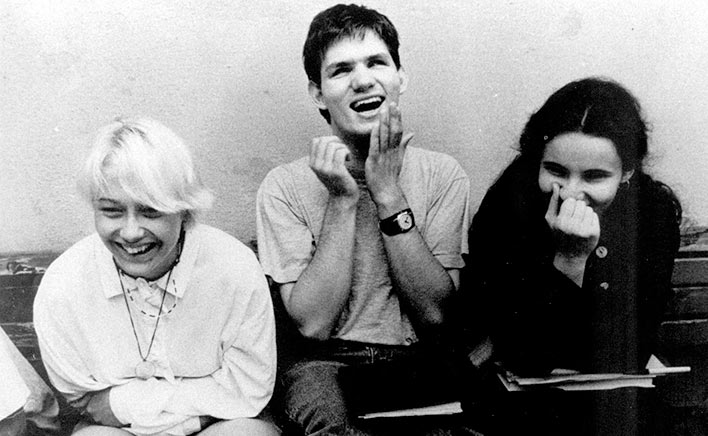
In 2017, Porto/Post/Doc features a focus on Czech filmmaker Miroslav Janek (a choice of Jana Sevcíková, the director revealed at the festival last year), author of a private work, where he seeks to give visibility to despised communities. Janek began his career as an editor, working in the United States with Godfrey Reggio. However, he returned to the Czech Republic where, in addition to his films, he currently teaches at the prestigious FAMU film school.
In this focus, the festival will screen The Unseen and Hamsa, I Am.
Q: You have experienced working, as editor, with Godfrey Reggio in the famous Quatsi trilogy. In what way that experience has changed you as a creator?
A: I would say that every experience brings some change in you but sometimes it is hard to precisely describe it. It could be just subconscious. Godfrey makes films that are totally different from mine, therefore I believe the experience of editing his films probably did not have any significant impact on my own directing. Even though I must admit that after getting to know his films I did find a lot of pleasure in sometimes having my characters looking straight into the lens of the camera without saying anything. That is doubtlessly the most direct and recognisable influence of Godfrey on my films. Otherwise, from the point of view of my editing experience which lasted for 20 years, it is without a doubt that working on Powaqqatsi, Anima Mundi and Evidence was the top experience and truly a great time not only professionally but also personally.
Q: You have directed many documentaries along the years. What is, in your opinion, the social function of a documentary?
A: The social function? You mean what good are the documentaries for people, for the audience? There are many layers, many possibilities, multiple functions, depending on the kind of documentary. It could be the chronicles of our time, it could be a provocation to a thought or thinking, it could inform you, it could take you into the unknown or just simply give you the pleasure of film poetry. And probably many other possibilities. Sorry, I am not much of a theoretician.
Q: Some of your films are about political figures and art creators. What fascinates you in this special kind of people?
A: I made only one film about a political figure – president Havel – and it was not my choice. I was asked to finish the film after the director of the film (Pavel Koutecký) died tragically. I would probably never choose to make a film about a politician but I must say that the personality of Havel fascinated me. The entire film was shot “behind the scenes” so to speak, it was shot in the “presidential kitchen” where the usual media are not allowed. That fact alone is fascinating. And Havel himself being a playwright and a former prisoner of the regime – what more can you ask for? As far as the art creators go I am not particularly seeking to make films about them, in fact, I try to discourage my students from doing so. Of course, I did make a few of those but in most cases, I concentrated on some special feature in their personalities and did not pay too much attention to their art. That means I was more interested in the person, not in the artist.
Q: In our festival, we will screen two films about two experiences with blind children and their communities. You also have directed other films about children and schools. What drives you to film these communities?
A: First of all, it is the fact of the unknown or a little known, therefore it is the curiosity. For example, the blind kids and handicapped in general were kept isolated in the communist regime. Not many people knew much about the way they are. I did not know much either and thanks to the process of filming I was able to get into their way of life. I must say that in most of my films it is the process of looking for something that defines the result, not a preconceived screenplay or a firm idea.
Q: The films show a lot your commitment to the projects. It seems that you need to be part of the community to be able to film it. How do you develop your projects?
A: Being a part of the community, at least during the preparations and filming is for me the most important aspect of the process. I spend a lot of time with the people I am filming but I am filming very little every day. Even now with the digital media, I try to shoot as little as possible. It is probably the habit from the 16mm days – for example, I had 30 shooting days for The Unseen and I shot only 5 hours of material. So, what did I do for the rest of the time? I just was there with the kids and when the right moment arrived my radar told me to grab the camera and shoot a little.
Q: The Unseen is an incredible cinematic experience. Can you talk specifically about this project and the difficulties of being and shooting in the school? It seems that you can forge a long friendship with your subjects.
A: There was only one difficulty with this film that I can remember. It was the first day of shooting and I could not shoot one single frame because the kids were so incredibly curious about the camera and Nagra (the sound recording machine) that it made any shooting impossible. Together with my soundman, we had to explain every detail, every button, the kids were like bees, it took hours and we were totally exhausted after that. But it gave me an idea for the opening of the film which I shot much later in the process.